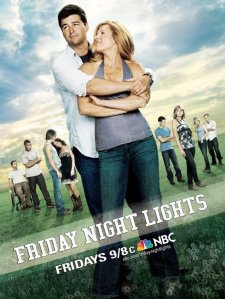You may have read about a study published in the journal Science last month. It showed that after reading “literary fiction” for just a few minutes, people scored higher on tests of emotional sensitivity than those who’d read popular fiction or straight nonfiction.
The reason, the study’s helmers explained, is that literary fiction leaves more to the imagination than other types of writing. Therefore, it prompts readers “to make inferences about characters and be sensitive to emotional nuance and complexity.”
The high-brow Lit world rejoiced. Here was justification for why literary authors such as Don DeLillo, Louise Erdrich and Wendell Berry (some of the writers used in the study) really were more worth reading than bestselling genre authors such as Gillian Flynn, Rosamunde Pilcher or Robert Heinlein.
The study got me wondering whether quality TV could accomplish the same kind of emotional smartening. I wondered this in particular about the now-defunct series Friday Night Lights, headed by writer Jason Katims. I’ve been watching and adoring the show on Netflix Instant.

Ostensibly, Friday Night Lights (FNL) follows a high school football team that has become the locus of an entire Texas town’s hopes and dreams. Yet the playing of football receives barely a few minutes of screen time per episode. Mostly, the show is interested in the personal lives of its characters: the ways they honor and betray each other and themselves.
Episode for episode, this show has engaged and moved me more than just about any literary novel I’ve read in the past year. Give me those Science exams! Because when I’m done watching FNL, I feel like I’d ace them. I’m more compassionate toward family and friends. I’m more emotionally honest in my own writing, more willing to dig deep into my characters’ inner lives. It’s not just FNL that has this effect. Mad Men, Freaks & Geeks and Six Feet Under do, too.
So what gives? FNL ain’t Don DeLillo. In many ways, it’s the opposite of much literary fiction. Its episodes follow a conventional setup-climax-epiphany structure. There is darkness, but little or no cynicism. And because it’s a drama about working class people, often with low levels of educational attainment, the dialogue is simple. There are no beautifully wrought sentences or bedazzling inner monologues.
But I think the common thread between quality TV and literary fiction is that each is willing to sit with ambiguity. When characters on FNL argue — and they do argue, often — each character in the scene makes valid points. No one is ever completely right, and no one is ever completely wrong. Contrast this with the typical crime procedural, where there is one truth. The detective or lawyer uncovers that truth while the criminal lies.
Also, the endings of the episodes — like literary novels — are open-ended. No crime is solved, no case decided, no romance tidily consummated. Lives become more complicated, not less. The trade-off, for the character and the viewer, is that those lives also become richer, more compassionate, more interconnected.
The best TV may be able to depict ambiguity even more efficiently than novels. That’s because TV doesn’t have to describe characters’ emotions: It can simply present them, leaving viewers to infer what’s going on behind the facade. And unlike movies, TV doesn’t have to wrap everything up after only 90 minutes. Shows go on year after year, evolving at a pace similar to real life.
One way in which FNL is exactly like literary novels? It was never a popular favorite. Its best year-end ranking in the Nielsen ratings was #114. This is also consistent with the Science study, in which subjects said they got more out of literary novels — but enjoyed reading non-literary ones more.
We’re not always in the mood to grow, it turns out. Sometimes we just want answers.
What about you? Which TV shows make you feel emotionally smarter? –Justin
